
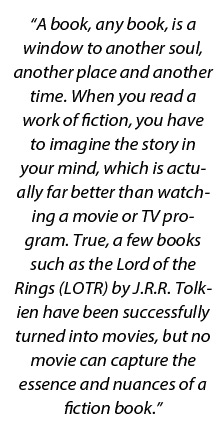
 As the saying goes “reading makes a full man (or woman)”. The printed word has been with us for more than 500 years and changed the world profoundly. From the gravity of Newton’s findings to the relative complexity of Einstein’s theories, books contain humankind’s repository of knowledge. Books have thus enriched our knowledge over the centuries.
As the saying goes “reading makes a full man (or woman)”. The printed word has been with us for more than 500 years and changed the world profoundly. From the gravity of Newton’s findings to the relative complexity of Einstein’s theories, books contain humankind’s repository of knowledge. Books have thus enriched our knowledge over the centuries.
A book, any book, is a window to another soul, another place and another time. When you read a work of fiction, you have to imagine the story in your mind, which is actually far better than watching a movie or TV programme. True, a few books such as the Lord of the Rings (LOTR) by J.R.R. Tolkien have been successfully turned into movies, but no movie can capture the essence and nuances of a fiction book.
The wonders of reading
Books such as LOTR can take you to fantasy and fantastic worlds. Science fiction books can transport you at the speed of light to galaxies far, far away, to places where no man has gone before. Books can also take you back or forward in time, to an altered past or an imaginary future. Romantic novels can make you fall in love all over again, while action thrillers can give you a rush of adrenaline.
Sometimes actual history can be even more exciting than imagined history. A good non-fiction book on history can take you back to a time when the world was a different place. Books on contemporary events – written as the events happen – can be even more riveting. As an example, I have been hooked on the trio of books by Bob Woodward on the Donald Trump administration – Fear, Rage and Peril.
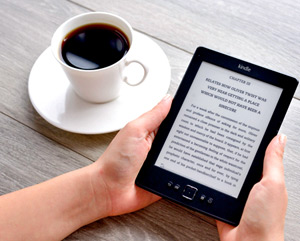 Another favourite category of mine is the biography (or the self-written version – autobiography). These books help us penetrate the souls of famous people alive or dead – one particular book I like is Walter Isaacson’s account of Steve Jobs, simply titled Steve Jobs: A Biography. From among the living, I recommend Hillary Clinton’s ‘Living History’ and Sir Richard Branson’s ‘Losing My Virginity’. There are many books on famous people – just Google for the results.
Another favourite category of mine is the biography (or the self-written version – autobiography). These books help us penetrate the souls of famous people alive or dead – one particular book I like is Walter Isaacson’s account of Steve Jobs, simply titled Steve Jobs: A Biography. From among the living, I recommend Hillary Clinton’s ‘Living History’ and Sir Richard Branson’s ‘Losing My Virginity’. There are many books on famous people – just Google for the results.
Science is another favourite topic of mine. Don’t forget cookery books, which help you rustle up tantalizing meals in next to no time. If you want to pursue a hobby and get help for it, there are plenty of books on subjects from gardening to stamp collecting. Books on travel help you to discover far-off places without even leaving your armchair. In my view, all households should have copies of the Dhammapada, the Holy Bible, the Bhagavad Gita and the Holy Quran – these religious texts can help us navigate sorrowful episodes in our lives and provide us with spiritual guidance, which is lacking in today’s commercialised world. And remember, some books do not even have to be read. Adult colouring books have taken the world by storm – they are an ideal way to pass the time in blissful solitude. Do bear in mind that I have mentioned only a few categories of books for want of space, but if you go to Amazon you can get an idea of all the categories.
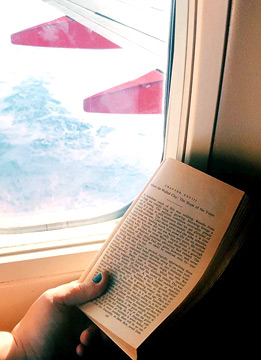 If you have children, do inculcate in them a love for reading. That is the first thing my mother, a teacher, did. Thanks to her, I have been reading voraciously since the age of six and as luck would have it, my wife also shares my love for reading. There are many good children’s books out there and yes, graphic/cartoon books such as Tin Tin and Asterix are a good way to get them into books.
If you have children, do inculcate in them a love for reading. That is the first thing my mother, a teacher, did. Thanks to her, I have been reading voraciously since the age of six and as luck would have it, my wife also shares my love for reading. There are many good children’s books out there and yes, graphic/cartoon books such as Tin Tin and Asterix are a good way to get them into books.
Find the time
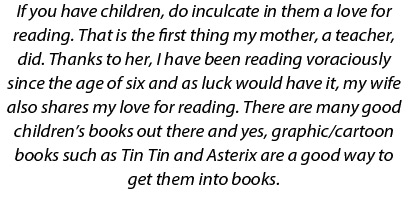 A common complaint I have heard is that people lack time to read, even if they would love to. But you can somehow find the time to read – even reading for 30 minutes a day can enrich your mind. You can also turn off the TV and read right before going to bed or even read in bed for a while.
A common complaint I have heard is that people lack time to read, even if they would love to. But you can somehow find the time to read – even reading for 30 minutes a day can enrich your mind. You can also turn off the TV and read right before going to bed or even read in bed for a while.
I encourage my colleagues to read whenever they are free in the office. If you travel by bus or train (and get a seat), why not read a book instead of the Facebook news feed? Audiobooks, many of which you can download for free, are another way to get into books without actually reading per se.
And do take a book or two with you if and when you travel domestically or overseas. If it is cheap enough, you can always leave it behind at your hotel so that a fellow traveller can read it. If you have excess books which you will not be needing or reading again, donate them to a library. This way, possibly hundreds of other people will benefit from your generosity.
In today’s world, books do not even have to be so-called dead-tree (paper) books. Devices such as the Amazon Kindle, B&N Nook and the Sony E-Reader can store thousands of books and unlike smartphones and tablets, these devices use a paper-like E-Ink screen which has no glare and is easy on the eyes. Of course, if you do not want to splash cash on a separate reading device, you can download books to your smartphone or tablet itself and read on the move, instead of the drivel you find on the Internet.
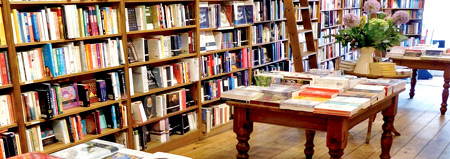 These devices are a blessing when you travel as you do not have to lug physical books around and moreover, with the text-to-speech feature, the device will even read the book to you. If you run out of books, you can simply download another.
These devices are a blessing when you travel as you do not have to lug physical books around and moreover, with the text-to-speech feature, the device will even read the book to you. If you run out of books, you can simply download another.
Physical books, unlikely to disappear
But reports of the death of physical books are greatly exaggerated. Physical books are unlikely to disappear for at least the next 100 years. There is something visceral about physical books that simply cannot be replicated by e-books, from the smell of the paper to the rustling of paper as you turn the pages over. But in order to put your conscience at ease, look for the Forest Stewardship Council (FSC) logo and recycled paper logos on the books you buy. This way, you will know that the books have been sustainably sourced and printed and that the reading habit will endure for centuries to come.
